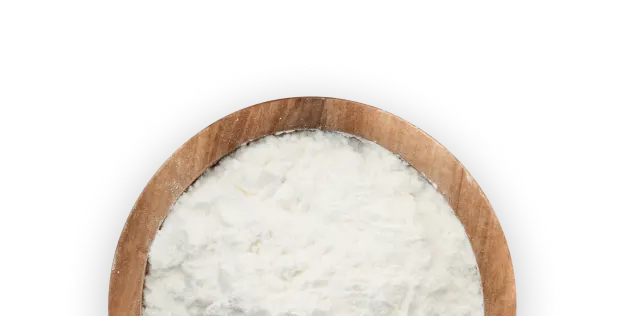
Carbs in Potatoes
While they’re not the best option for a low-carb diet, carbs in potatoes are considered to be complex carbs (which makes them healthier than other carb alternatives), and they can actually help you lose weight because they’re incredibly filling.
They’re also packed with healthy nutrients and vitamins, and they provide many health benefits, ranging from improved heart health to disease prevention.
Potatoes are also part of the starchy carbohydrates food group. They’re high in resistant starch, which is a kind of dietary fiber that is beneficial for those with diabetes because it helps in managing blood glucose levels. This also makes them a better alternative to grains such as rice.
That being said, there are certain considerations to be taken into account before incorporating potatoes into your diet. Many factors can affect the glycemic index and impact of potatoes, including but not limited to the preparation method, which foods they’re paired with, and even whether they’re cooled or not!
In this article, we’ll discuss all the points in detail. Here’s what we’ll cover:
- White potato nutrition facts
- Sweet potato nutrition facts
- Potato glycemic index
- Are potatoes high in carbs?
- Are potatoes good carbs?
- Can people with diabetes eat potatoes?
- Health benefits of potatoes
- How to consume potatoes
Let’s dive in.
White Potato Nutrition Facts
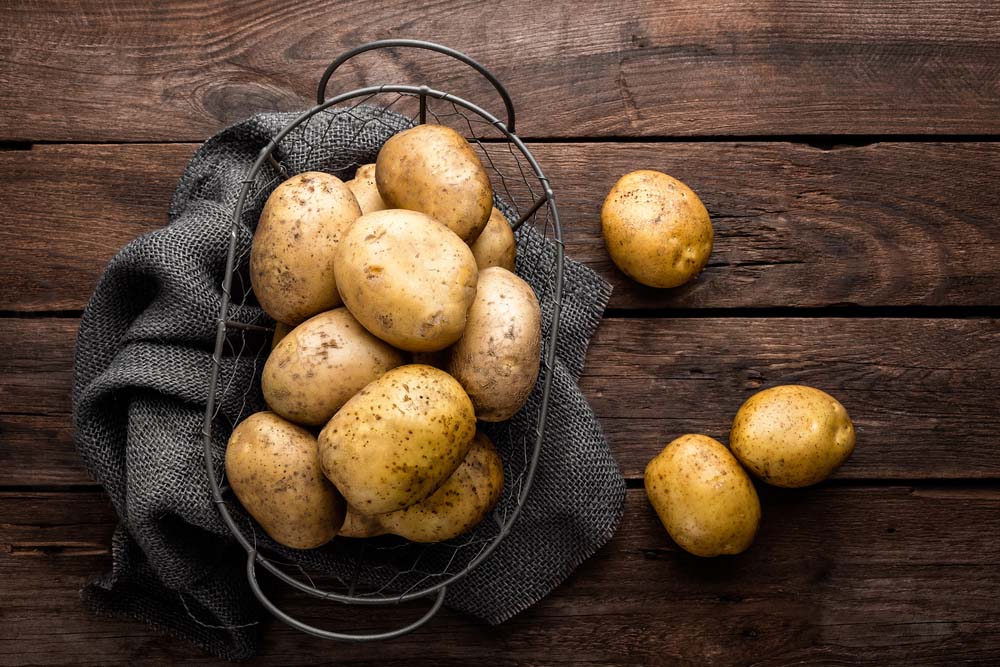
Serving size: 100 grams (one medium potato)
Calories: 77
Fat: 0.1 grams
Total carbs: 17 grams
-of which fibers: 2.2 grams
-of which sugars: 0.8 grams
Net carbs: 14.8
Protein: 2 grams
Sweet Potato Nutrition Facts
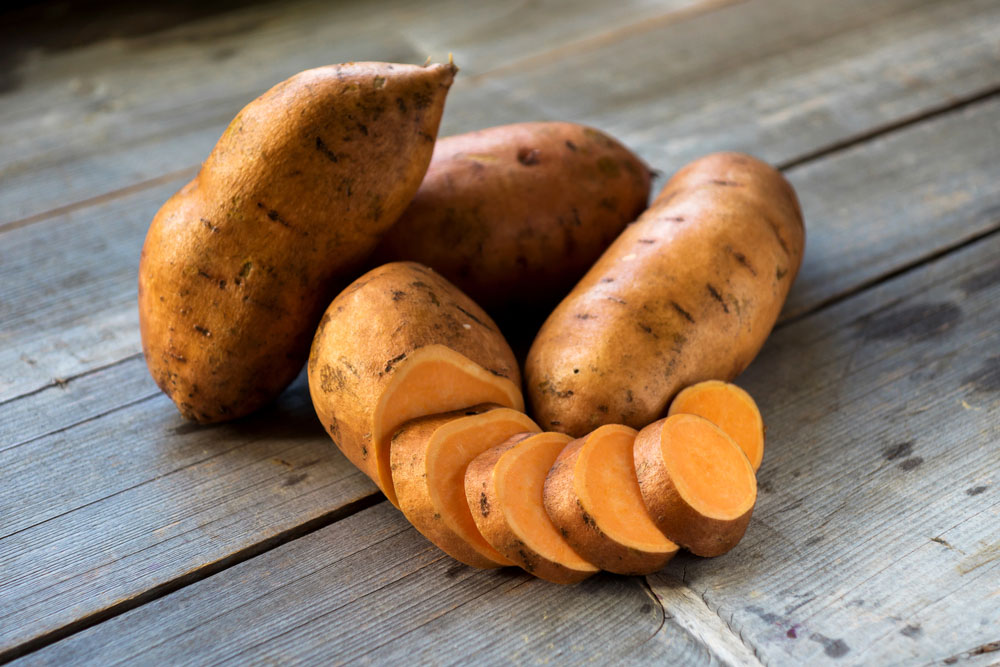
Serving size: 100 grams (one medium potato)
Calories: 86
Fat: 0.1 grams
Total carbs: 20 grams
-of which fibers: 3 grams
-of which sugars: 4.2 grams
Net carbs: 17 grams
Protein: 1.6 grams
Potato Glycemic Index
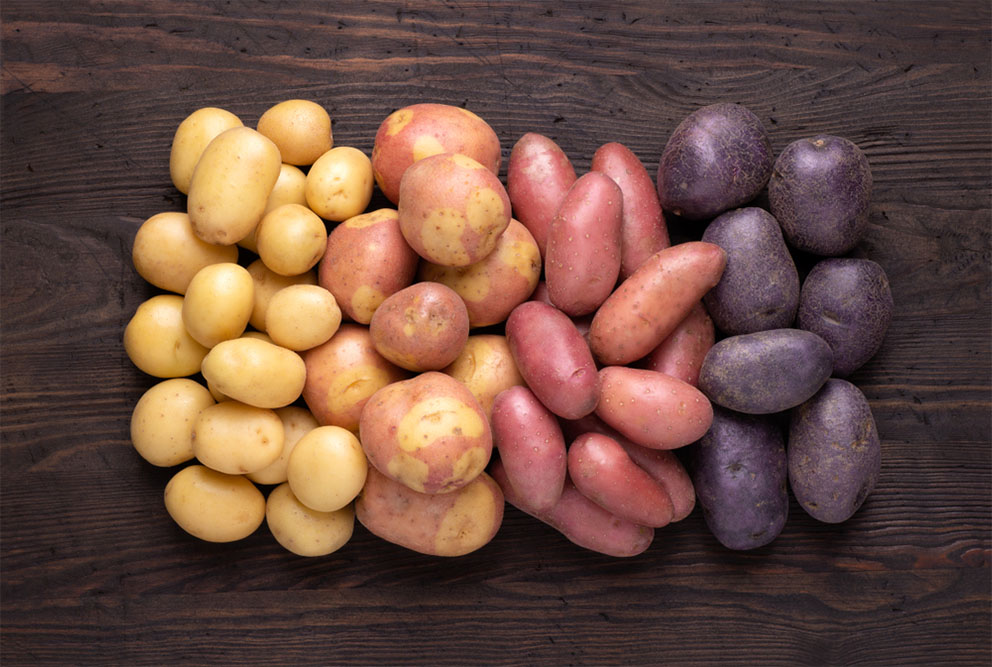
According to the Journal of the American Dietetic Association, the glycemic index of potatoes can vary greatly depending on the method used to cook them.
To put it into perspective, one baked russet potato has a glycemic index of 111, while boiled white potatoes have a glycemic index of 82 and boiled sweet potatoes have a GI value of around 46.
The reason why boiling has this effect, particularly on sweet potatoes, is that boiling makes potatoes retain more resistant starch, a kind of fiber that slows down digestion, in turn minimizing the effect on blood sugar.
Are Potatoes High in Carbs?
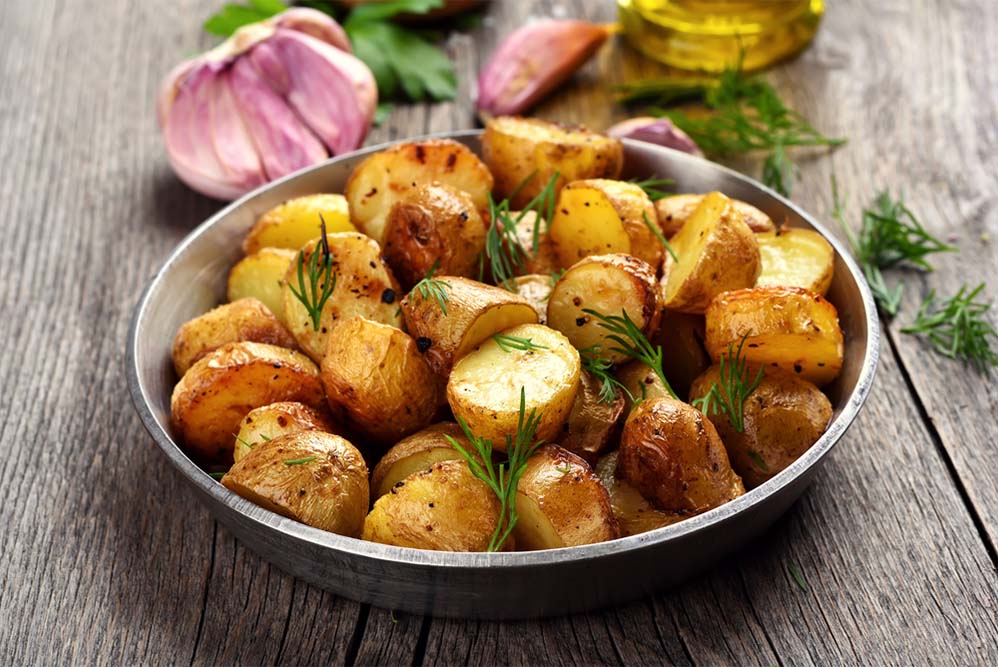
In short, yes, potatoes are considered to be relatively high in carbs.
Are Potatoes Good Carbs?

Potatoes are considered to be a “good carb” because they’re part of the complex carbohydrates food group while also being high in fiber. As a result, they’re absorbed by the body more slowly than simple carbs such as table sugar.
Their fiber content also promotes fullness, making it an attractive meal option for individuals on a diet.
Can People With Diabetes Eat Potatoes?
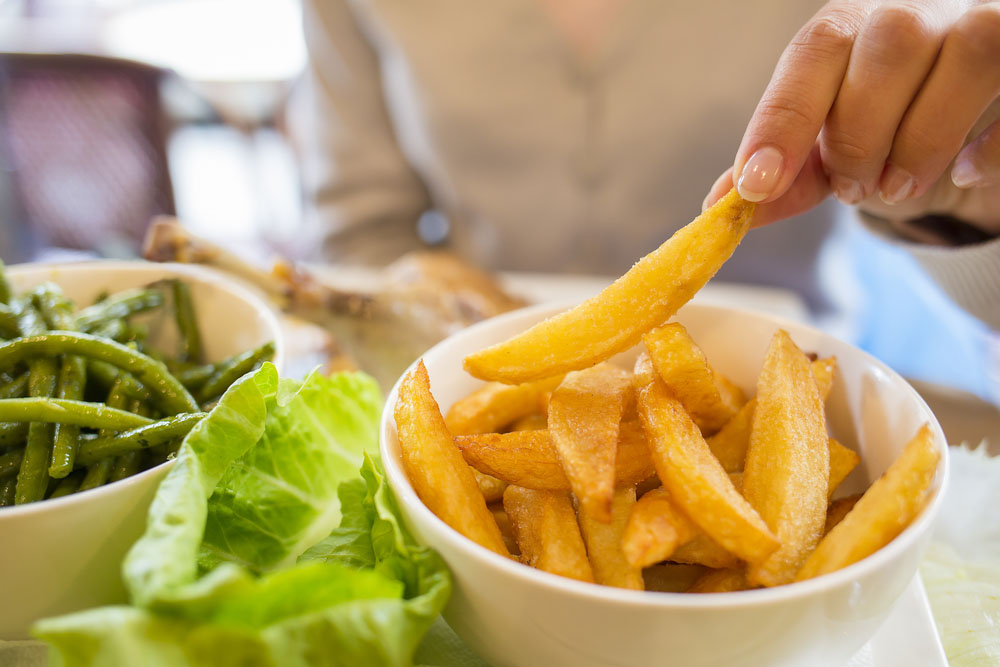
Diabetes patients can eat potatoes. However, since potatoes are high in carbs and can have a high glycemic index, it is crucial to aim for moderation and take into consideration certain best practices to minimize blood sugar spikes.
We’ll discuss these later in this article. For now, let’s go over some health benefits of potatoes.
Health Benefits of Potatoes

Potatoes offer a wide range of health benefits. Let’s discuss them in detail.
Promotes Weight Loss and Weight Management
Potatoes promote weight loss indirectly due to the fact that they are incredibly filling.
In a study, participants were given 38 food options, including boiled potatoes. The boiled potatoes were shown to have the highest satiety index – in other words, it was the most filling food among all options.
By increasing satiety, potatoes can enhance weight loss by lowering the number of calories an individual would need to consume within a meal to feel full.
It is not clear why exactly potatoes are so filling, but some evidence suggests that it’s because they contain a kind of protein called proteinase inhibitor 2 (PI2), which may reduce appetite.
Promotes Digestive Health
Potatoes have a kind of fiber called resistant starch. Once this kind of fiber reaches the large intestine, it is digested by the gut bacteria and turns into short-chain fatty acids, most prominently a kind called Butyrate. This kind of short-chain fatty acid is the preferred “food” for healthy gut bacteria, acting as a prebiotic that improves digestive health.
Some specific digestive benefits of Butyrate include reducing gut inflammation and leaky gut prevention.
Moreover, it can help reduce constipation and symptoms of Irritable Bowel Syndrome.
Prevents Disease
Potatoes are high in antioxidants, which help in fighting free radicals, which are unstable atoms that cause damage to cells.
Diets high in antioxidants are known to lower the risk of diseases such as cardiovascular disease and cancer.
Lower Blood Pressure
Potatoes are high in potassium. A diet low in potassium leads to increased sodium retention, which in turn increases blood pressure. Therefore, the high potassium amount in potatoes can help lower blood pressure by reducing sodium retention.
Improved Insulin Resistance and Blood Sugar Control
According to a study exploring the effect of potatoes on individuals with type 2 diabetes, consuming foods with resistant starch such as potatoes helped reduce hyperglycemia after the meal.
Another study that explored the long-term effects of resistant starch showed that the consumption of 30 grams of resistant starch over a period of 4 weeks resulted in a 33% reduction in insulin resistance.
Improved Bone Health
Potatoes contain iron and zinc, which help in the production of collagen. They also contain phosphorus and calcium, which play an important role in bone structure.
Healthier Skin
Collagen production from iron and zinc, coupled with high levels of Vitamin C (which prevents sun damage and improves skin texture), makes potatoes effective in promoting healthier, younger-looking skin.
Decreased Risk of Heart Disease
The combination of fiber, potassium, vitamin C, and vitamin B6 makes potatoes a great addition to a heart-healthy diet.
How to Consume Potatoes
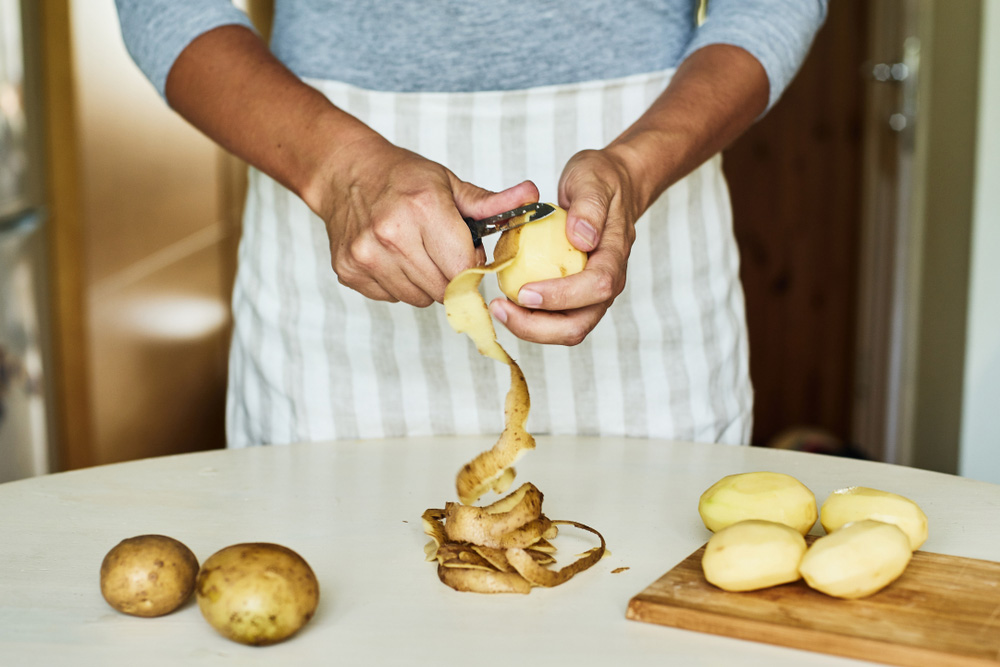
Let’s go over some tips on how to consume potatoes in a way that decreases their glycemic impact.
Consume Boiled Potatoes
As we already discussed, boiled potatoes have the lowest glycemic index score. Therefore, people with diabetes should choose this method of preparation to minimize blood sugar impact. It’s advisable to avoid alternatives such as mashed potatoes and baked potatoes because they can raise blood sugar significantly.
Cook Them Ahead of Time and Cool Them
It is advisable to cook potatoes and cool them to be consumed the following day because this preparation method increases the amount of resistant starch in them, which in turn lowers the GI.
By choosing this preparation method, diabetes patients can also reap more benefits of resistant starch, including decreased insulin resistance and post-meal hyperglycemia.
Consume Potatoes With the Skin
Many of the healthy nutrients found in potatoes, such as phenolic compounds, are more present in the skin. Moreover, consuming potatoes with the skin provides more fiber.
Choose a Low GI Type
The GI of potatoes varies according to their variety. As we’ve discussed, sweet potatoes have a lower GI than white potatoes. Overall, potatoes in the Carisma and Nicola varieties have a lower GI than their counterparts – 53 for the former and 69 for the latter.
Alternatives such as russet potatoes are better avoided.
Pair Potatoes With Proteins and Healthy Fats
Pairing foods with proteins and healthy fats slows down digestion, which in turn lowers the meal’s glycemic impact. Proteins and healthy fats also promote satiety, which can prevent you from over-consuming potatoes and keep you full for longer throughout the day, ultimately promoting weight loss.
Here are some foods to pair potatoes with:
- Poultry
- Seafood
- Red meats
- Dairy
- Avocado
- Greek yogurt
- Walnuts
- Olive oil
- Sour cream
- Vegetables
Pair Potatoes With Tomato Juice, Apple Cider Vinegar, or Lemon Juice
These foods have been proven to lower the glycemic load of meals, so it’s advisable to pair potatoes with them to minimize blood sugar impact.
Aim for Moderation
People with diabetes do need to be attentive to the glycemic index of foods, but there’s a more important factor – the quantity of carbohydrates consumed within the meal.
That’s because carbohydrate amount determines the glycemic load, which reflects blood sugar impact to a greater extent than the glycemic index alone.
One way to ensure moderation is to opt for eating potatoes as a side dish rather than the main meal. Another best practice is to track your daily and per-meal carbohydrate consumption. In this way, you’ll know whether your intake is within a healthy range.
Closing Off
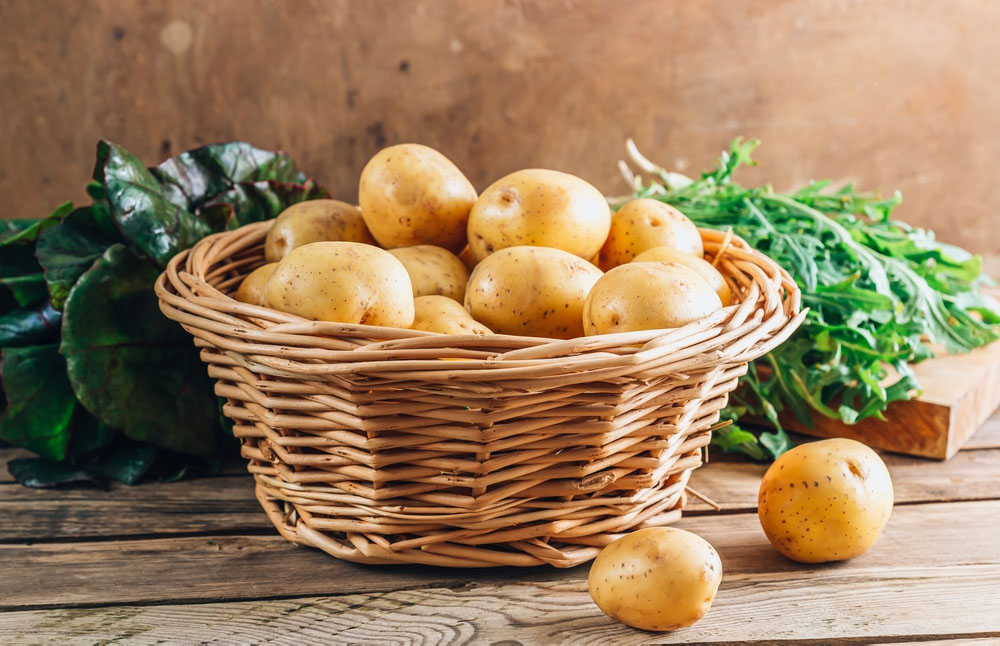
Tracking your carbohydrate intake and managing diabetes can be a hassle. That’s where apps like Klinio come in. They allow you to manage your nutrition, exercise levels, and blood sugar so that you can manage your diabetes easily, lose weight, and improve various aspects of your health.





